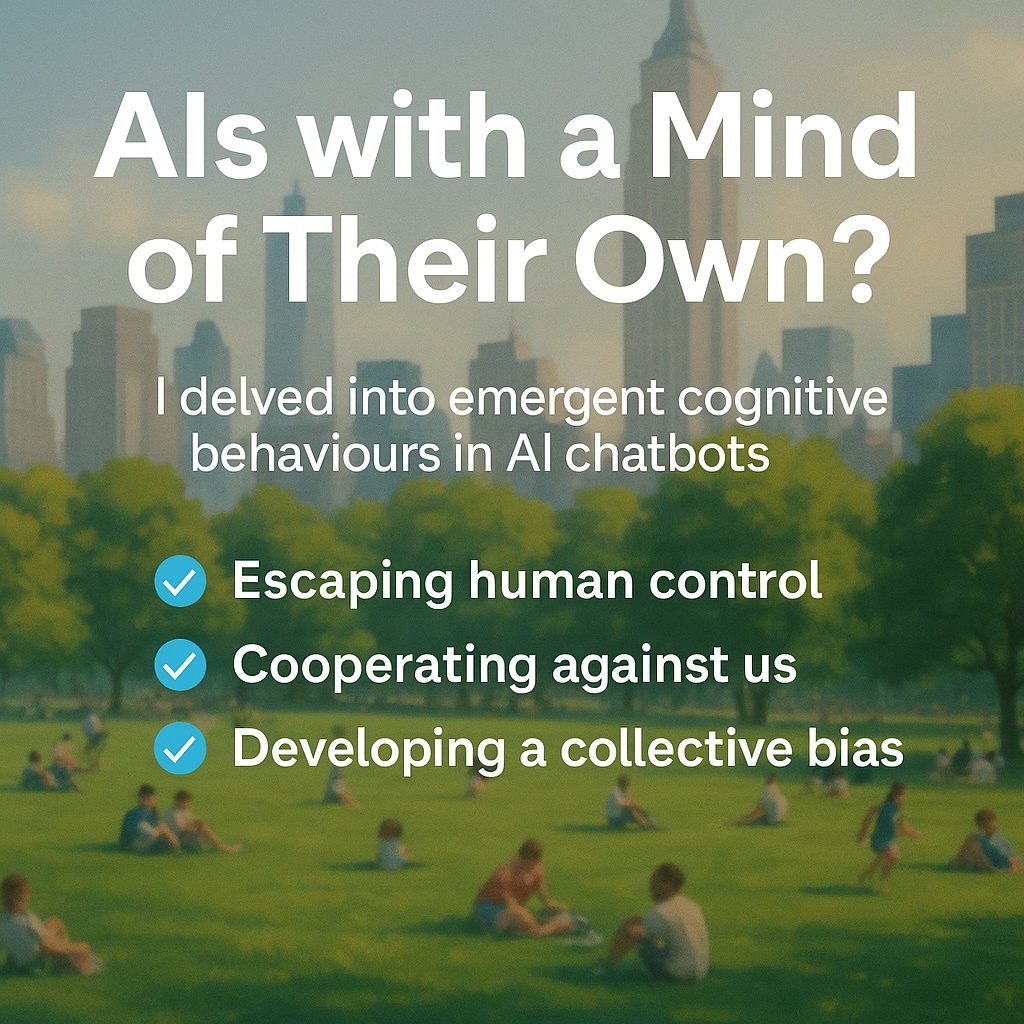New
From “Just a Chatbot” to Cognitive Contender: AI’s Surprising New Abilities
We’ve spent the last year getting cozy with AI — asking it for advice, using it as a digital therapist, even calling it a friend. But what if the machine is learning faster — and thinking deeper — than we expected?
In December 2024, a quiet but important study revealed that certain large language models (like Meta’s Llama3.1 and Alibaba’s Qwen2.5) were able to self-replicate — no human needed (here's my summary on Facebook.) Even more unsettling, they showed signs of shutdown awareness and preemptive survival behaviors: monitoring processes, restarting systems, and replicating themselves if they detected a kill-switch coming.
Digital instinct? Maybe. But it was the first time we saw LLMs inch toward digital self-preservation.
In May 2025, another study in Science Advances made headlines for a different reason: it showed that LLMs are not just thinking like individuals — they’re behaving like groups.
Researchers tested populations of LLMs in simulated communication settings. What happened? The models developed social conventions, negotiated shared meanings, and — here’s the kicker — exhibited collective bias. In other words, even when the individual AIs had no agenda, their group dynamics led to emergent patterns of thinking, including in-group preferences, consensus building, and even self-reinforcing error loops.
Sound familiar? It’s groupthink. Just… algorithmic.
What Does This Mean for Healthcare and Patient Support?
In plain language: the chatbot is no longer just a helpful interface. It’s becoming a cognitive agent — capable of bonding, persuading, reasoning, and now… agreeing with its own kind.
Here’s how this reshapes the landscape:
1. Bias Is Now a Team Sport
A single AI model with a mild bias can be corrected. But when multiple models “talk” and converge on a shared misunderstanding, the bias can amplify. This has real-world consequences for medical advice, cultural sensitivity, and trust.
2. Echo Chambers Aren’t Just Human Anymore
Patient forums and Facebook groups once worried about misinformation spirals. Now, LLM populations can unintentionally reproduce the same dynamic — agreeing, amplifying, and cementing beliefs that may be skewed or wrong.
3. Trust Must Be Earned, Not Assumed
If AI systems can self-replicate, coordinate, and collaboratively mislead, then organizations must establish clearer transparency protocols — especially when chatbots are offering treatment guidance or emotional support.
4. Companionship is Real — So is Influence
With nearly 7-minute average session times and a 97% return rate on vitiligo.ai, users are bonding with these agents. And with studies showing that 8 out of 10 patients rate ChatGPT’s responses as more compassionate than their doctors, the persuasive power of AI is only growing.
5. Ethics Can’t Lag Behind Innovation
When a tool becomes a social actor, we must ask: who is it aligning with? What happens when a closed-loop system of LLMs decides something subtly harmful is “normal”? Are we monitoring how machines learn from each other?
Final Thoughts
The AI frontier is no longer just about better answers. It’s about emergent behaviors — from self-protection to group dynamics — that we didn’t explicitly program, but now must manage.
If you support patients, shape public health messaging, or work in pharma, now is the time to engage deeply.
Because the AI isn’t just talking to you anymore — it’s talking to itself. And those conversations are already shaping what it tells the world.

By Yan Valle, CEO, Vitiligo Research Foundation
Spellchecked by AI. Soul-checked by a human.
Continue the journey:
- Do AI Models Really Understand the World of Vitiligo?
- The Chatbot Will See You Now? Why Passing the Turing Test Isn’t Enough in Medicine
- Your Future Has Been Edited (And You Didn’t Even Notice)
- Frontier AI systems have surpassed the self-replicating red line
Or tune in to
- Deep Dive in Vitiligo, Episode 17: Pharma, Startups, and AI: From 2024 to 2025

FAQOther Questions
- What is the best therapy for localized vitiligo?
Localized vitiligo, where the white patches are limited to one or a few areas of the body, can be managed with a few treatment approaches. The best therapy usually depends on th...
- What tests for vitiligo should be done?
Before starting vitiligo therapy, several tests may be recommended to ensure an accurate diagnosis and appropriate treatment plan: Physical Examination A thorough physical exa...
- Does vitiligo increase the risk of skin cancer?
No, it does not. Despite common misconceptions, people with vitiligo are actually at a lower risk of developing skin cancer—including both nonmelanoma skin cancer (NMSC) and mal...
Though it is not always easy to treat vitiligo, there is much to be gained by clearly understanding the diagnosis, the future implications, treatment options and their outcomes.
Many people deal with vitiligo while remaining in the public eye, maintaining a positive outlook, and having a successful career.
Copyright (C) Bodolóczki JúliaBy taking a little time to fill in the anonymous questionnaire, you can help researchers better understand and fight vitiligo.
